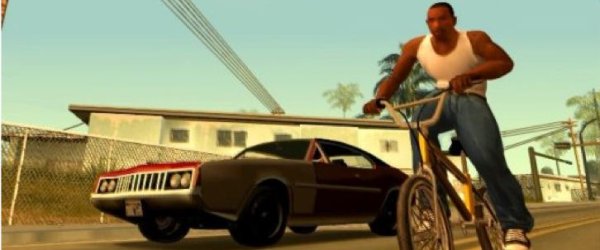Less risk, coupled with a focus on beefing up revenue streams by creating oodles of paid downloadable content for just about every game under the sun, quickly became the overarching theme. And the year was just getting started. Lucky you: We've got a complete rundown on all the news that was fit to print (with a healthy dose of the unfit included).
A 14-year-old kid kicked off the year in style when he tried to make his life imitate pixelated art. The Bakersfield, California boy went on a Grand Theft Auto: San Andreas-inspired crime spree, stealing bikes at BB-gunpoint before leading cops on a chase and ultimately getting himself arrested. No word on whether or not he tried to recreate Hot Coffee. What's shocking about the story is that the juvenile wasn't trying to play a real-life version of Call of Duty: Modern Warfare 2. It seemed like the entire world was playing Activision and Infinity Ward's shooter in early 2010 (feel the deja vu), and the publisher reported in January that the game had surpassed the monumental $1 billion mark at retail in just over two months.

So much more fun in real life! Minus getting arrested and the whole "criminal record" thing.
January was also the month BioShock developer 2K Boston (formerly known as Irrational Games) got sick of being repeatedly referred to as "2K Boston (formerly Irrational Games)" and reverted back tobeing good ol' Irrational Games. But the biggest name change came from Apple, when the tech giant's long-rumored iSlate was revealed as the iPad -- and millions of people around the world immediately charged hundreds of dollars to pre-order the tablet computer without really being sure how they would use it.
Electronic Arts threw a snowball at GameStop and used video game retailers everywhere in February when it revealed Project $10, a DLC-based strategy designed to entice gamers to buy new games instead of pre-owned ones. Buy a fresh copy, and get a few extra in-game goodies, says the ongoing plan. Buy used, and you'll have to pay $10 for the same DLC. For its part, GameStop shrugged off the news and continued to report solid growth and open new locations, like a game store version of Starbucks. But other game publishers quickly followed suit with similar initiatives, making Project $10 (and later Online Pass) the new industry norm.
EA needed the extra cash generated by Project $10 when the Super Bowl rolled around and the publisher decided to shell out an estimated $2.5 million for a 30-second commercial during the biggest football game of the year. The commercial capped a lengthy, multichannel marketing campaign for one of the few new franchises Electronic Arts would try to launch in 2010, Dante's Inferno... and ultimately served as a $2,500,000 reminder of why EA wants to focus on sequels, sequels, sequels.
February also brought us one of the year's best gaming industry laughs, courtesy of our friends at the most widely ignored ratings board in the world, the ESRB. In detailing its M for Mature rating for Dead or Alive: Paradise, the ESRB told everyone what it really thinks about Tecmo's bikini beach volleyball game, describing it as "creepy voyeurism," "bizarre," and full of "misguided notions of what women really want." Summing things up nicely, the ESRB delivered our 2010 Hilarious Line of the Year: "Paradise cannot mean straddling felled tree trunks in dental-floss thongs." Says who, ESRB?

Is that a felled tree trunk?
As the winter snow receded in March, the industry heated up with one of its biggest news months of the year. Nintendo officially announced its glasses-free, stereoscopic 3D gaming handheld -- immediately making the DSi XL irrelevant before it was released in the U.S. Valve revealed that its digital distribution and gaming platform, Steam, was headed to the Mac, effectively multiplying the number of games available on Apple computers by 1,000. And some dude in North Carolina sold his copy of NES rarity Stadium Events for more than $41,000. We're not sure what's more unlikely: that someone would have an unopened copy of the 1987 track-and-field game or that someone would be willing to fork over $41,000 for it.


